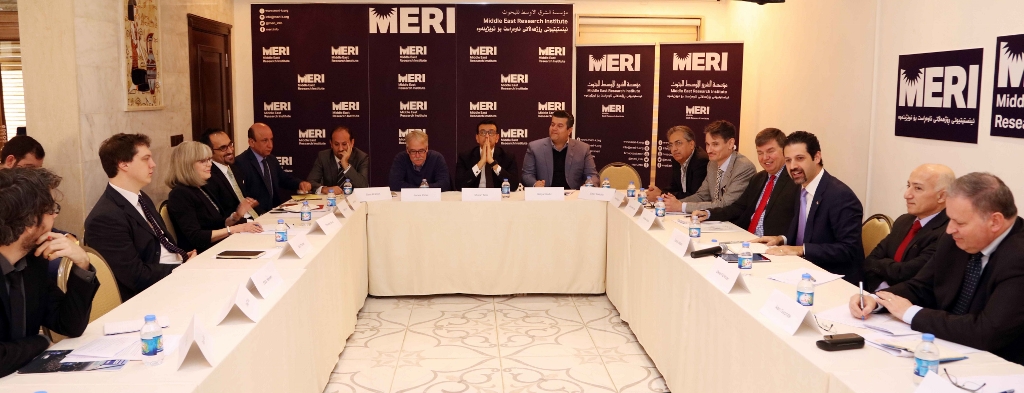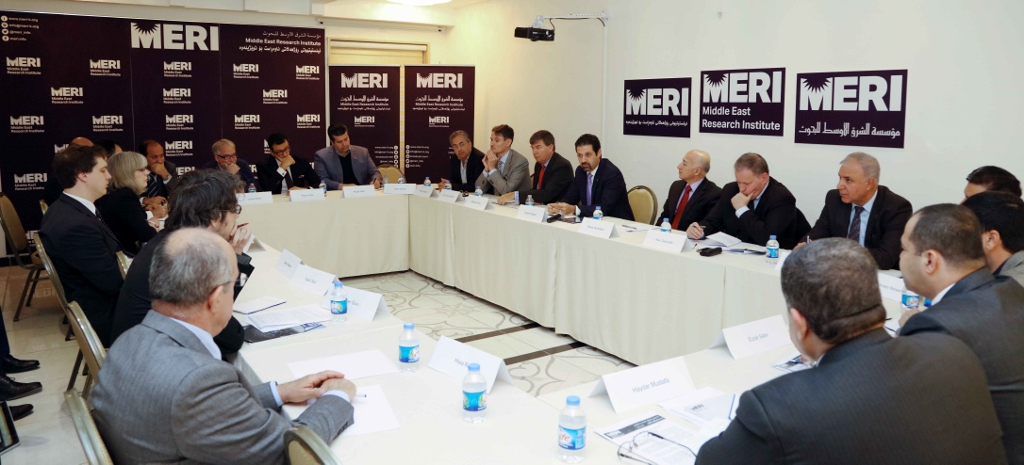The discussion with KRG officials, academics, business community and the diplomatic community highlighted the reforms needed and ways forward.
The Kurdistan Region is now entering its third year of economic crisis, with mounting harmful social and political fallout emerging from it. The symptoms of the overall crisis extend pervasively over the whole economic system, negatively affecting government function, household resilience, private sector survival and public services provision. The system was never prepared to buffer a crisis of this magnitude. Logical questions emerge: What is the ultimate origin of these woes? What can be done to curb the immediate crisis effects? How to transition towards a more sustainable economic system?
To discuss the status quo and ways forward, MERI hosted a roundtable debate on January 13, with the participation of a wide range of stakeholders in the transition of Kurdistan’s economy: KRG officials, including the Deputy Prime Minister Qubad Talabani, academics, finance experts, members of the business community and representatives of the diplomatic community, including the Consuls of the US, France and Netherlands.

The Deputy Prime Minister and his economic office highlighted the reality that the current economic crisis is bigger than just a budget issue or liquidity constraints. To curb the crisis, balancing the budget and reforming the public administration is the highest priority and the economic office has put all efforts in it. In words of the officials present in the round table, the government has the focus on crisis management and needs to make this a national project, away from the political in-fight. This was a strong signal that there are efforts to create a consensus on the reforms needed to build the foundations for a sound economy. Indeed, communicating effectively the scale of the crisis and debating transparently the reforms is also a crucial aspect that officials highlighted in the round table.
The diplomatic community sent a strong message that Kurdistan’s international allies have a total commitment in helping the KRG to overcome this crisis, especially through supporting policy design and implementation. They highlighted that the government must not wait until better times to initiate an agenda of reforms beyond balancing the budget. To materialise the help, a clear political will for reforms is needed.
This round table debate represented the adequate setting to launch the latest research report at MERI, “In best of times and worst of times: addressing structural weaknesses of the Kurdistan’s Region economy”. The research fellows at MERI highlighted during the debate that, after analysing both symptoms of the crisis and structural weaknesses in the economy, the austerity measures currently implemented must be balanced with a wider agenda of reforms to be put forward gradually to build a more resilient system.
Critical to this is the reinforcement of initiatives and policies aimed at private sector development; improvement of the functioning of the public administration and its budget; and transformation of Kurdistan’s institutional landscape connected to the economy. Such agenda is crucial because foreign creditors, local business community, civil society, and the public as a whole demand a strong signal that there is a political will to change how things work at all levels and that cohesion is maintained within society.

Among the participants of the roundtable meeting were Othman Shwani, the secretary of the KRG’s economic council; Amanj Raheem, Cabinet Secretary and Chief Legal Advisor for KRG, Herish Muharram, former minister of KRG’s Investment Board; Bilal Wahab, Director of Center for Development and Natural Resources, American University of Iraqi Sulaimani; Dr. Ezat Sabir, head of the Investment and Economy Committee in the Kurdistan Regional parliament. Haydar Mohammed, Director General of KRG’s Ministry of Planning.
Related Media
-
“The deadlock in the construction sector was predicted” former head of Investment Board
-
Economic diversification in the Kurdistan Region: Interview with Bilal Wahab
- “The Government should make it more profitable to invest in the private sector” U.S. Consul General
* * * * *
About MERI: The Middle East Research Institute is Iraq’s leading policy-research institute and think tank. It is an independent, entirely grant-funded not-for-profit organisation, based in Erbil, Kurdistan Region. Its mission is to contribute to the process of nation-building, state-building and democratisation via engagement, research, analysis and policy debates.
MERI’s main objectives include promoting and developing human rights, good governance, the rule of law and social and economic prosperity. MERI conduct high impact, high quality research (including purpose-based field work) and has published extensively in areas of: human rights, government reform, international politics, national security, ISIS, refugees, IDPs, minority rights (Christians, Yezidis, Turkmen, Shabaks, Sabi mandeans), Baghdad-Erbil relations, Hashd Al-Shabi, Peshmarga, violence against women, civil society. MERI engages policy- and decision-makers, the civil society and general public via publication, focused group discussions and conferences (MERI Forum).

